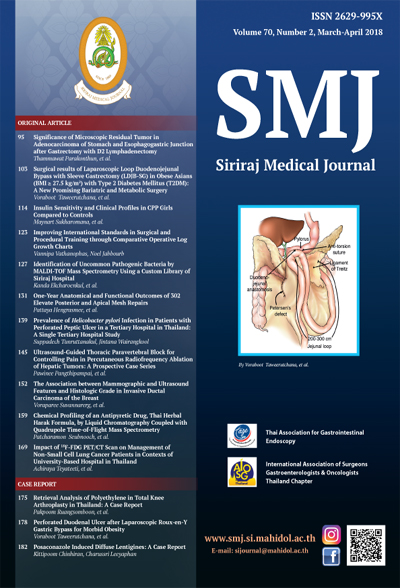Perforated Duodenal Ulcer after Laparoscopic Roux-en-Y Gastric Bypass for Morbid Obesity
Abstract
Objective: Duodenal ulcer perforation after laparoscopic Roux-ex-Y gastric bypass (LRYGB) for morbidly obese patient is uncommon. However, the morbidity and mortality rate will be increased if the diagnosis is delayed. We
reported clinical presentations, surgical approach as well as outcome of first perforated duodenal ulcer after LRYGB
in E-Da hospital.
Case presentation: A 34 years old morbidly obese female who underwent successful LRYGB in 2006. Five years later, she developed severe epigastric pain and marked tenderness at this area. No pneumoperitoneum was demonstrated on
abdominal CT scan. First diagnostic laparoscopy was done and showed unexplained hemoperitoneum at subhepatic area without definite cause of abdominal pain. Unfortunately, she had to undergo re-diagnostic laparoscopy on
postoperative day 2 because bile content was present in abdominal drain. Luckily, the perforated duodenal ulcer was detected at 1st part of duodenum and closed properly by simple suture techniques. Postoperatively, there was no
complication and she was discharged home uneventfully. Helicobacter pylori and life-long proton pump inhibitor were prescribed. Upon 3-month follow-up, she had no abdominal pain or other complications.
Conclusion: The diagnosis of perforated duodenal ulcer after LRYGB for morbidly obese patients is challenging. Although laparoscopic simple suture is safe and feasible in acute perforated scenario, this might carry high recurrent
rate due to the remaining parietal cells in gastric remnant. Nevertheless, the role and timing of definitive acidreducing surgery need to be addressed by having well-designed studies in future.
Downloads
Published
How to Cite
Issue
Section
License
Authors who publish with this journal agree to the following conditions:
Copyright Transfer
In submitting a manuscript, the authors acknowledge that the work will become the copyrighted property of Siriraj Medical Journal upon publication.
License
Articles are licensed under a Creative Commons Attribution-NonCommercial-NoDerivatives 4.0 International License (CC BY-NC-ND 4.0). This license allows for the sharing of the work for non-commercial purposes with proper attribution to the authors and the journal. However, it does not permit modifications or the creation of derivative works.
Sharing and Access
Authors are encouraged to share their article on their personal or institutional websites and through other non-commercial platforms. Doing so can increase readership and citations.











